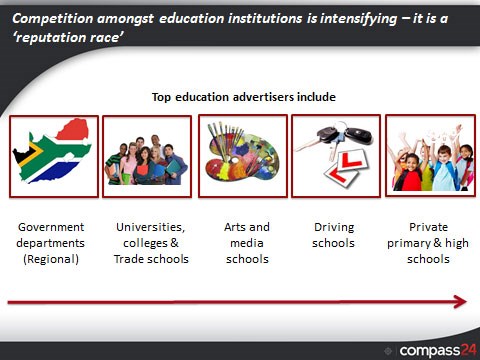Some 41% of local title readers are influenced by their newspaper when choosing an educational institution.
The readers of Media24's local titles prioritise quality education according to Compass24 research commissioned by Ads24 and conducted by Ask Afrika. Over 80% will choose an institution based on the quality of education, over proximity and price. Education is big business.
"With an annual fee of R209,000, Hilton College in KwaZulu-Natal is South Africa's most expensive private school. Hilton, along with Michaelhouse (R192,000 pa), the second most expensive private school in the country, are of the only remaining schools that are pure boarding schools, that do not offer day student education," says an article on Businesstech.
This is followed by St Martins in Johannesburg which comes in at R184,460, St Andrews College in Grahamstown at R182,700, Kearsney College in the KZN Midlands at R181,350, Roedean School for Girls in Johannesburg at R181,140, and St Alban's College in Pretoria at R181,000. The article lists another 15 schools that have annual fees of over R142,000. Not only are these schools expensive, but securing a place in one of them is very difficult, and children are required to be put onto waiting lists often from birth, if not before in some cases.
The 'reputation race'
Competition amongst education institutions is increasing; it is a 'reputation race'. This is true not only for the elite private schools, but in all market sectors. There is increasing evidence of financial literacy in the black middle class and a deep determination to invest in children. Education is an absolute priority for 60% of the majority group or middle market sends their children to model C schools (public schools but with high fees) or private schools, and this number is likely to grow. (Unilever Report)
According to Compass24, over two thirds of Media24's local title readers have achieved a Matric or higher. Of those with a Matric or higher, 15% want to further their education.
Education for many South Africans is the legacy they leave their child. It is a huge decision selecting an institution to which to entrust a child's future. Parents are horrified to see unemployed graduates, especially after they have put their savings into education. There is a fierce battle between schools, between technikons, and universities.
"The advertising for educational institutions fits neatly next to pictures of corporate scholarships, corporate CSI, swimming gala pictures, and crèche openings," says Tania Barzu, Head of Trade Marketing and Strategy at Ads24.
"The need for higher and further education and training in South Africa is intensifying in the face of an extremely competitive job market and a national unemployment rate of 25%. However, a number of challenges affect the provision of education, from limited resources to continuing technological developments, the growth of niche education and distance learning, the relationships between employers and education providers, and the need for qualifications to be relevant to the workplace," says Japie Heydenrych in an article on Bizcommunity.
Education news is community news
Over half the readers in Compass24 read the entire newspaper and six out ten feel community topics are dealt with well. Education news is community news.
"The relevance of local papers to education is often broader than advertising courses and vacancies. Local newspaper readers value CSR content, which they rate as a top ten topic of interest. There is an opportunity for advertisers to not only to shout about product offers and special price deals, but to work on their quality of awareness by talking about their CSI in Ads24 titles," say Andrea Rademeyer CEO and founder of Ask Afrika.
CSR that is education-related bears significant relevance to South Africa, and the list of private sector businesses that are publicising their CSR education initiatives is growing. One of the biggest challenges facing South Africa is the non-delivery of important and basic needs, in particular in the field of education.
"Companies have the opportunity to build their reputation through announcing their CSR educational initiatives in our local titles. This kind of exposure can add great value to a brand, and connect them with local communities," says Barzu.
































